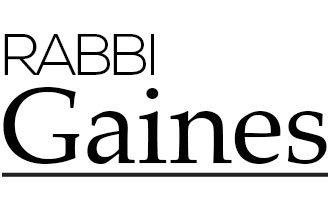Staying sane in an insane world is difficult, for who amongst us is immune to its temptations? First the challenge: We are living in a high tech, fast-paced, impulse-driven reality in constant danger of becoming just another diseased mind (distracted and confused) of a 21st century machine. Our newly elected “overlords” sell us cheap thrills and demand we enjoy it, and enjoy it we do! Think about it, if thriving on the pain and misery of others wasn't immensely popular, the exploitive media, e.g. tabloids, would be out of business. Now the good news: there is a path, a Biblically inspired system formulated by the great Talmudic Rabbis that can help reorient the wandering mind and heart to focus on what truly matters: our soul, a relationship with our Creator.
In their (the Rabbis) original language, “The world stands on 3 pillars: service, study of Torah, and acts of kindness” (Talmud).
To clarify:
“Service” = Prayer.
“Torah study” = daily Torah/Bible learning.
“Acts of kindness” = good deeds.
These “pillars” are as if support beams, created to strengthen our “spiritual house” (our spiritual self), equipping us with the knowledge needed to weather the mighty storms of our complex world. Question: Why 3 pillars, why not 5 (like the 5 Books of Moses) or 10 (like the 10 commandments)? In Kabbalah, we are taught, man’s conscious self, the part of him susceptible to corruption, exists at 3 levels: thought, speech, and deed. Hence, if he (man) is to guard himself from the distractions of the world, he need erect a shield that protects these 3 areas of vulnerability.
To simplify:
“Service” (prayer) protects the mind.
“Torah” (Bible study) protects the heart.
“Good deeds” (acts of kindness) protects the body.
Let’s begin with prayer, the first of our 3 pillars.
Prayer (in Hebrew “Tefilah”) derives from the Hebrew root whose meaning is “connection.” When we pray we connect our all, our totality, to the Creator. That being said, there is a “general”, a leader of the body if you will, without which we can’t form a meaningful connection to our Creator. That “general” of the body is our mind. In the words of the great Tzadik (righteous holy soul) Rabbi Yisrael Ba’al Shem Tov, “You are where your thoughts are.” A wondering mind (a mind distracted by the vanities of the world) prevents us from connecting deeply and meaningfully to God. To remedy this, the Sages instituted daily prayer, i.e. “connection,” as explained above. Such connection binds the mind of man to his/her Creator thus enabling all of him/her to maintain a sustained relationship.
Our second pillar is Torah (Bible) study.
In the 5th book of the Torah, Moses commands Israel, “And you will speak in them” (Deuteronomy 6:7). “In them,” explain the Sages, meaning, in the words of the Torah (the Bible). From this verse the Sages of the Talmud learn that one’s mouth should be preoccupied only with God’s words - God’s Holy writ as recorded in the Bible. Question: How can a person practically speak only about God? What about everyday conversation, casual banter? Explain the Sages, one must seek to reveal God wherever he or she is found; hence, even a casual conversation must be steered toward meaningful spiritual topics. No wasted speech! To help us rectify our speech so the words of our mouth should reflect Godly consciousness, the Sages instituted daily Torah/Bible study (the amount of which, great or small, depends upon the individual). By learning and vocalizing God’s word (as recorded in the Torah/Bible) we strengthen our ability to shift reality toward its intended spiritual expression.
The 3rd and final pillar is “Good deeds.”
The great Tzadik (righteous and holy soul) Rabbi Noam Elimelech of Lizhensk once said, “In previous generations, Divine service emphasized Torah study. Now, in our time, Divine Service emphasizes (more than anything else) good deeds.” Question: Why is our time (our generation) especially focused on good deeds?
Explains the great Tzadik Rabbi Menachem Mendel of Lubavitch (the Rebbe), “Holy actions touch the simple essence of God.” To briefly explain, holy actions reveal Godliness at the level of the body (since it is the body that is used to carry them, the actions, out.) When we physically practice kindness, e.g. charity, we fulfill God’s ultimate desire, “And they will make for me a sanctuary and I will dwell in them” (Exodus 25:9). Ask the Sages, what does it mean “in them?” Who’s “them?” Explain the Sages, in their (the people’s) experiences! Hence, when we “act” (physically perform acts of kindness) we make a dwelling place (in ourselves) for Him. Such unity (God and man) at the level of body fulfills our Creator’s ultimate desire. Explains the Rebbe, as we near Moshiach’s (the Messiah’s) time (when His ultimate desire - to dwell with us- will be fulfilled), we prepare by creating “vessels” through holy actions. Such practice sanctifies and protects man at the level of body.
Conclusion: By practicing daily Prayer, Torah/Bible study, and Good Deeds, we protect our thoughts, words, and deeds from the vanities of the world. Such a 3 fold sanctification elevates our human experience to become a vessel (a holy vehicle) for Him.



